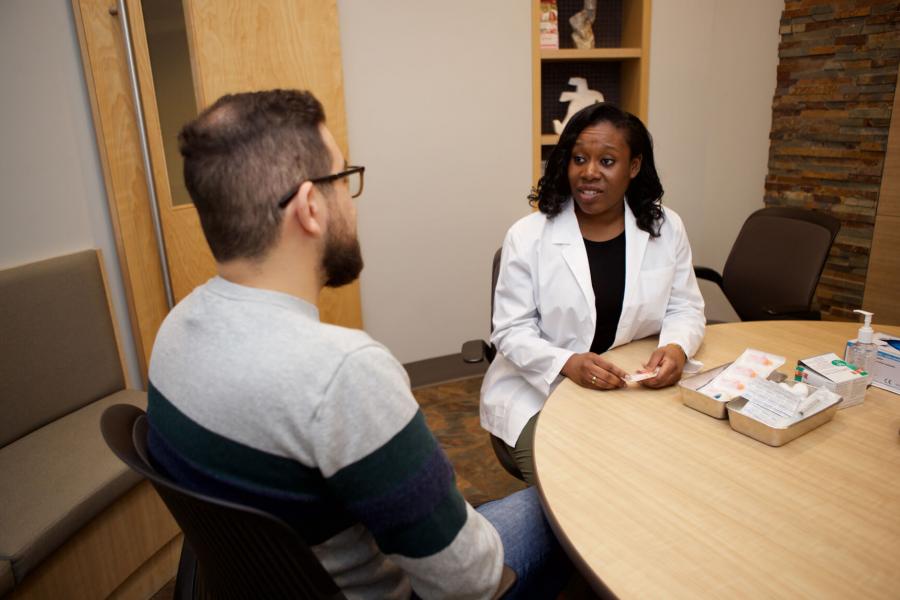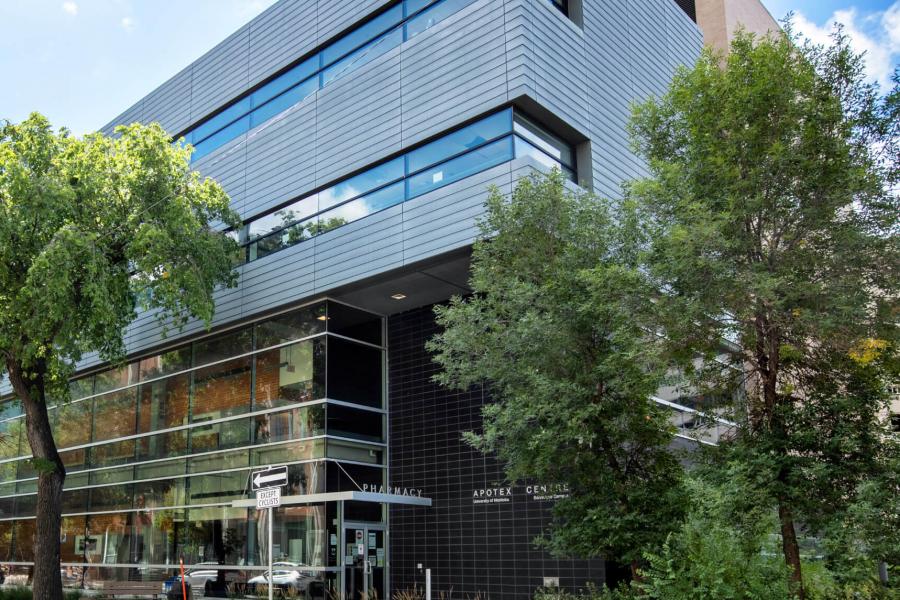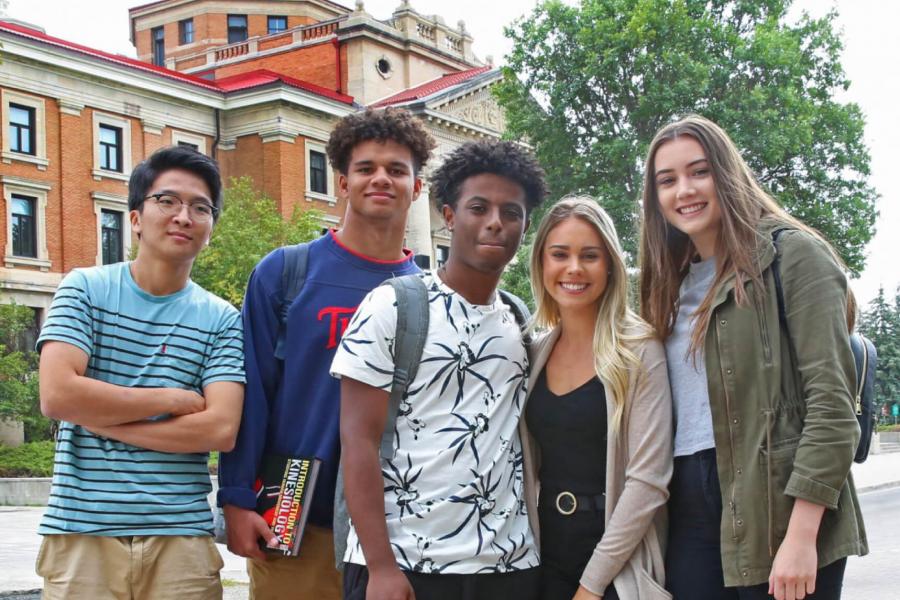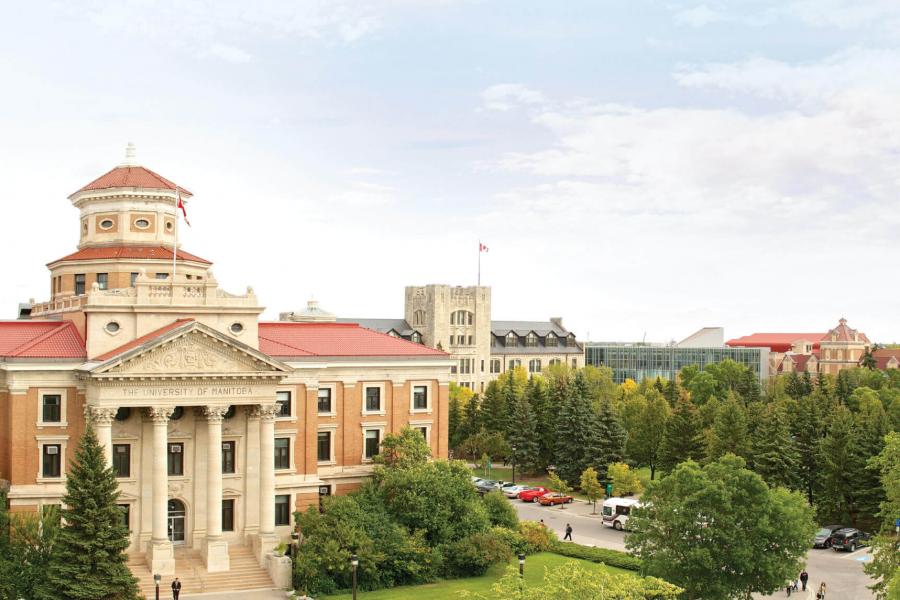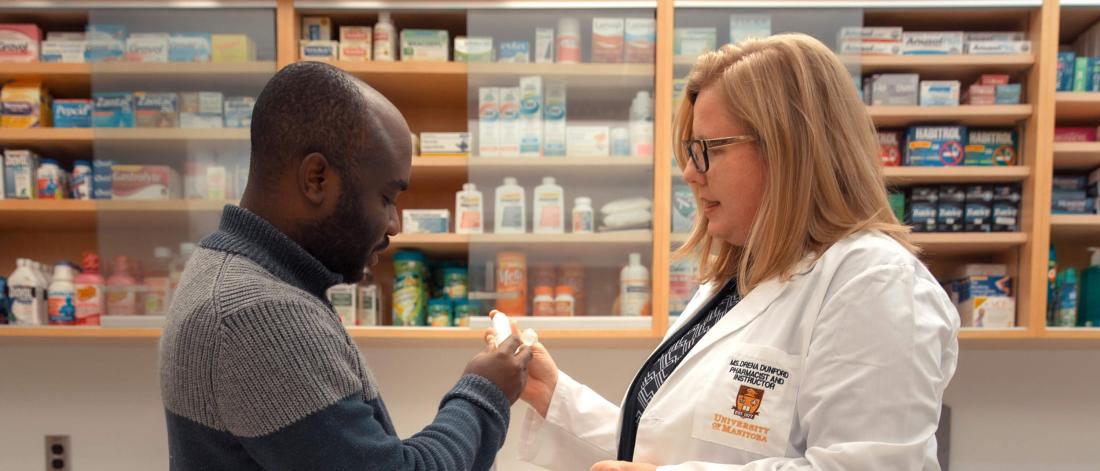
Study with us
Our story
Watch this brief video to learn more about our program and what we have to offer.
Program details
The Doctor of Pharmacy (PharmD) is a four-year undergraduate doctoral program that requires two years of previous university studies. Throughout the program, you will focus on clinical practice, experiential learning, and pharmaceutical sciences, all of which will prepare you for a successful career in pharmacy.
Expected duration: 4 years (plus 2 years of qualifying study)
The program aims to equip students with a solid foundation in basic, pharmaceutical, and clinical sciences, which will enable them to provide entry-level patient care. Additionally, students will gain broad experience in patient care through experiential placements in various health-oriented settings, including hospital and community pharmacies. The program also includes an elective rotation in the final year to enhance the overall learning experience.
Areas of focus
- medication use and safety
- applied pharmacy practice
- simulation labs
- interprofessional education
- experiential learning
- Indigenous health
For a full listing of courses, please visit the academic calendar.
Program outline
Year 1
The first professional year explores the scientific underpinnings of Pharmacy with courses in Pharmacology, Human Anatomy, Medicinal Chemistry, Pharmaceutics, and Applied Pathophysiology. As well, students are introduced to the professional role of the pharmacist, with Pharmacy Informatics, Extemporaneous Pharmaceutical Compounding, and an Applied Pharmacy Practice Laboratory. A general introduction to the Pharmacotherapy Literature is also provided in the first year.
Year 2
The second professional year continues the Applied Pharmacy Practice Laboratory and further develops study in Pharmacotherapy Literature and Clinical Therapeutics. The second professional year explores the actions of drugs on the body in greater detail (Drug Delivery, Applied Biopharmaceutics and Pharmacokinetics, Pharmacogenetics), as well as the relationship between nutrition and health. The professional role is further developed with an introduction to the regulatory environment (Pharmacy Law), and the community and hospital practice environments.
Year 3
In addition to continuation of the Applied Pharmacy Practice Laboratory, ongoing study in Pharmacotherapy Literature and Clinical Therapeutics and further development of the topics introduced in the second professional year, the third professional year provides greater exposure to the pharmacist’s clinical (Advanced Therapeutics, Toxicology of Medications and Drug Abuse, and Concepts of Integrative Medicine) and professional roles (Applied Professional Practice, and Pharmacy Management).
Year 4
The PharmD is designed to provide students with service-learning opportunities throughout the program, with in-depth experiences in patient care settings through placements in hospital, community, and primary care settings in the final year of studies.
These experiences are further enhanced with an elective rotation and exposure to the research domain (Pharmacy Research Project) in the final year.
Experiential education
Being a successful pharmacist means being as skilled at patient relationships as you are at understanding medications. The Doctor of Pharmacy curriculum is patient care-focused, which means you will leave the program ready for practice to your full scope immediately upon graduation.
The Experiential Education Program is a series of rotations that help students transfer knowledge and skills from the classroom into real life pharmacy practice.
Working closely with experienced preceptors in settings like patient care clinics, hospitals, community pharmacies and primary care centres, students develop confidence and build the strong patient-care skills they’ll need for careers of their own. There are Introductory Pharmacy Practice rotation opportunities early in the program along with Advanced Pharmacy Practice rotations in the 4th year of the program.
Internationally educated health professionals
Internationally educated health professionals should visit the access hub for details related to obtaining Canadian credentials.
Admission requirements
The following are minimum requirements for entry into the PharmD program. Meeting these requirements does not guarantee acceptance into the program. Admission is highly competitive with 55 seats available each year.
To be considered for admission to the Doctor of Pharmacy program, you must first complete 48 credit-hours of university-level study, which includes specific required courses. Additionally, you must attain a minimum adjusted grade point average of 3.0 or higher, and complete a situational judgement test (CASPer).
To review the complete list of admission requirements, please refer to the College of Pharmacy Application Bulletin (PDF) provided below.
If you do not meet the criteria for admission into the Doctor of Pharmacy program, you may still qualify for entry into the Faculty of Science or another program. For those who have not attended university previously, there are programs with direct entry available, such as University 1.
How to apply
Domestic student application fee: $100
Applications to the University of Manitoba are completed online. To begin your application, select the Start or continue your application button. The online application includes several parts, and you may be required to submit transcripts, proof of English Language proficiency, and other documents.
Academic requirements
All applicants must:
- Complete a minimum of 48 credit hours of required (core courses and electives) courses by April of the year of application
- Complete a minimum of 1 Regular Fall/Winter session (Sept-April) with a minimum of 24 new credit hours of university level degree-credit courses
- Achieve an AGPA of 3.00 or higher
- Complete the English CASPer test. Applicants must achieve a threshold CASPer score greater than 1.5 standard deviations below the mean for their respective applicant pool in order to maintain their eligibility.
- Meet the University of Manitoba written “W” requirement
Applicants who have completed some of their core courses through an Advanced Placement (AP) or International Baccalaureate (IB) program must still complete one regular session (Sept-April) with a minimum of 24 new credit hours. No credit will be given for any course which was completed more than ten years before the year of application.
CASPer test
All applicants to the College of Pharmacy at the University of Manitoba are required to complete the online CASPer® assessment, to be eligible for admission.
CASPer® is an online test that assesses for the personal and professional characteristics we believe are important for successful students and graduates of our program. In implementing CASPer®, we are trying to enhance fairness and objectivity in our selection process.
Please go to www.takeCASPer.com to create your Altus Suite account and sign up for the Pharmacy/ CSP-10201 – Canadian Professional Health Sciences version of CASPer®.
Test requirements
In order to take the CASPer® test, you will need the following:
- Government-issued photo ID
- Valid email address
- Working webcam
- Working microphone
- Reliable high-speed internet connection
Test dates
- There are a limited number of testing dates available. Please note that these are the only testing dates available for your CASPer® test.
- You must select College of Pharmacy – University of Manitoba for distribution before the posted distribution deadline.
- Last-minute bookings are not recommended.
- There likely will not be any additional tests scheduled, but the most up-to-date information can be found at this link: https://takealtus.com/dates-times/.
Taking the test
- The CASPer® test can be taken practically anywhere that you can satisfy the aforementioned requirements.
- If you require testing accommodations for CASPer®, you will need to submit the Accommodations Request Form signed by you and your qualified professional three weeks in advance of your desired test date.
- The test typically takes between 60-90 minutes to complete.
- Halfway through the test, there is an optional 10-minute break.
Test content
- The CASPer® test is comprised of 12 sections: eight video-based and four word-based scenarios.
- Following each scenario, you will be required to answer a set of three probing questions in five minutes or less.
- Each of the 12 responses are anonymized and scored by a unique rater, giving a robust and reliable impression of your personal and professional characteristics important to our program.
Preparing for the test
No studying is required, however, you are encouraged to familiarize yourself with the test format via the System Requirements Check and 12 section sample test prior to taking CASPer®.
Additional helpful resources are available free of charge at https://takecasper.com/test-prep/ and https://takecasper.com/faq/.
Test results
CASPer® test results are valid for one admissions cycle.
Applicants who have already taken the CASPer® test in previous years will therefore be expected to re-take it.
For more information about the test, email support@takecasper.com or use the chat function at takecasper.com.
Application categories
The College of Pharmacy accepts an annual intake of 55 students to the PharmD program. Applications will be accepted under the following three admission categories:
- Manitoba Resident Applicant Pool
- Canadian Indigenous Applicant Pool
- Out of Province Applicant Pool
Please refer to the College of Pharmacy Application Bulletin (PDF) for details.
GPA requirements and scores
Applicants must achieve an Adjusted Grade Point Average (AGPA) of 3.0 or higher. For additional information, see the
The AGPA will be calculated as follows:
(0.55 x the Core Course GPA) PLUS (0.45 x the Cumulative Other GPA)
The Core Course GPA represents the average for the required prerequisite core courses, inclusive of all attempts.
The Cumulative Other GPA represents the average grade for all courses, exclusive of the prerequisite core courses, completed at the university degree level within the past 10 years, inclusive of all attempts.
All eligible applicants are ranked for selection using an overall score according to the following criteria (subject to eligibility provisions):
- Adjusted Grade Point Average (AGPA) 75%
- CASPer 25%
Required (core and other) courses for University of Manitoba applicants
IMPORTANT: applicants who have previously completed the historic CHEM 1300/1310 (6 credit hours) Introductory Chemistry sequence, rather than the new CHEM 1100/1110/1120 (9 credit hours) requirement, must complete an additional 3 credit hours of 'Other courses (any Faculty)' in order to meet the total of 48 credit hours of course work needed for admission.
| Courses | Credit hours |
|---|---|
| Introductory Chemistry - CHEM 1100/1110/1120 or CHEM 1300/1310 | 9 (or 6) |
| Organic Chemistry - CHEM 2100 or 2210 | 3 |
| Biochemistry - CHEM 2360 or 2700 | 3 |
| Biology BIOL - 1020/1030 | 6 |
| Physiology BIOL - 2410/2420 | 6 |
| Microbiology - MBIO 1010 | 3 |
| Mathematics - MATH 1500 or 1230 | 3 |
| Statistics – STAT 1000 or 1150 | 3 |
| Total Core Courses | 36 (or 33) |
| Humanities/Social Sciences | 12 |
| Other courses (any Faculty) for applicants with CHEM 1300/1310 only | (+3) |
| Total Other Cores | 12 (or 15) |
| Total Required (Core and Other) | 48 |
Required courses for University of Winnipeg applicants
| Courses | Credit Hours |
|---|---|
| Introductory Chemistry CHEM 1111 & 1112 | 6 |
| Organic Chemistry CHEM 2202 | 3 |
| Biochemistry CHEM 3502 | 3 |
| Biology BIOL 1115 & BIOL 1116 | 6 |
| Physiology KIN 2204 & 3505 | 6 |
| Microbiology BIO 2902 | 3 |
|
Mathematics MATH 1101 or 1102 or 1103 |
3 |
| Statistics STAT 1501 or 1301 & 1302 | 3 |
| Total Core Courses | 33 |
| Humanities/Social Sciences | 12 |
| Other courses (any Faculty) | 3 |
| Total Other Courses | 15 |
| Total Required (Core and Other) | 48 |
Required courses from Brandon University
| Courses | Credit Hours |
|---|---|
|
Introductory Chemistry 18.160 & 18.170 |
6 |
| Organic Chemistry 18.261 | 3 |
| Biochemistry 18.363 | 3 |
| Biology 15.162 and 15.163 or 94.162 & 94.163 | 6 |
| Physiology No equivalent course | 6 |
| Microbiology 15.269 | 3 |
| Mathematics 62.181 | 3 |
| Statistics 62.171 | 3 |
|
Total Core Courses |
33 |
| Humanities/Social Sciences | 12 |
| Other courses (any Faculty) | 3 |
| Total Other Courses | 15 |
| Total Required (Core and Other) | 48 |
Required courses from other universities
If you attended or are attending an institution external to the University of Manitoba please review the Transfer Credit Equivalency Database [DC1] to determine if your course(s) have been previously assessed.
Courses submitted for consideration by external applicants that have not been evaluated as directly equivalent on transfer may be considered by the College of Pharmacy Admissions Committee on a course-by-course basis, for admission purposes only, using the following.
If your course(s) are not a direct equivalent to the University of Manitoba required course listed in Section 2: Eligibility Requirements, B. Required Courses, 1. Required Courses from the University of Manitoba, a syllabus must be submitted for evaluation after the application is submitted and before the listed deadline. The College of Pharmacy Admissions Committee reserves the right to refuse admission if they determine that the prerequisite requirements have not been met.
| Courses | Credit Hours |
|---|---|
| Two semesters of 1000 level (first-year) Introduction to Chemistry, with a laboratory | 6 |
| One semester of 2000 level (second-year) Organic Chemistry | 3 |
| One semester of 2000 level (second-year) Biochemistry | 3 |
| Two semesters of 1000 level (first-year) Biology, with a laboratory | 6 |
| Two semesters of 2000 level (second-year) Human Physiology | 6 |
| One semester of 1000 level (first-year) Microbiology, with a laboratory | 3 |
| One semester of 1000 level (first-year) Calculus | 3 |
| One semester of 1000 level (first-year) introductory Statistics or Biostatistics | 3 |
| Total Core Courses | 33 |
| Courses designated Humanities / Social Sciences at the 1000 level or higher | 12 |
|
Other courses (any faculty) |
3 |
| Total Other Courses | 15 |
| Total Required (Core and Other) | 48 |
Applicants must also have completed a 3 credit-hour course which meets the University of Manitoba’s Written English (W) requirement. This can be included as part of the above requirements.
If your course(s) are not a direct equivalent to the University of Manitoba required course listed in the UM Transfer Credit Equivalency Database [DC1] , a syllabus must be submitted for evaluation after the application is submitted and before the listed deadline. The College of Pharmacy Admissions Committee reserves the right to refuse admission if they determine that the prerequisite requirements have not been met.
Learn more
Contact us
Admission and application inquiries
Mailing address
Undergraduate Admissions
424 UMSU University Centre
University of Manitoba
66 Chancellors Circle
Winnipeg, MB R3T 2N2 Canada
Office location
Room 424 UMSU University Centre
65 Chancellors Circle
University of Manitoba (Fort Garry campus)
Submit a question
Phone: 204-474-8808
Toll-free: 1-800-224-7713 ext 8808
Program inquiries
College of Pharmacy, Rady Faculty of Health Sciences
143 Apotex Centre
750 McDermot Avenue
University of Manitoba (Bannatyne campus)
Winnipeg, MB [R3E 0T5]
pharmacy@umanitoba.ca
Phone: 204-474-9306
Fax: 204-789-3744




